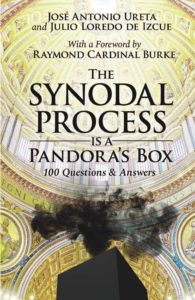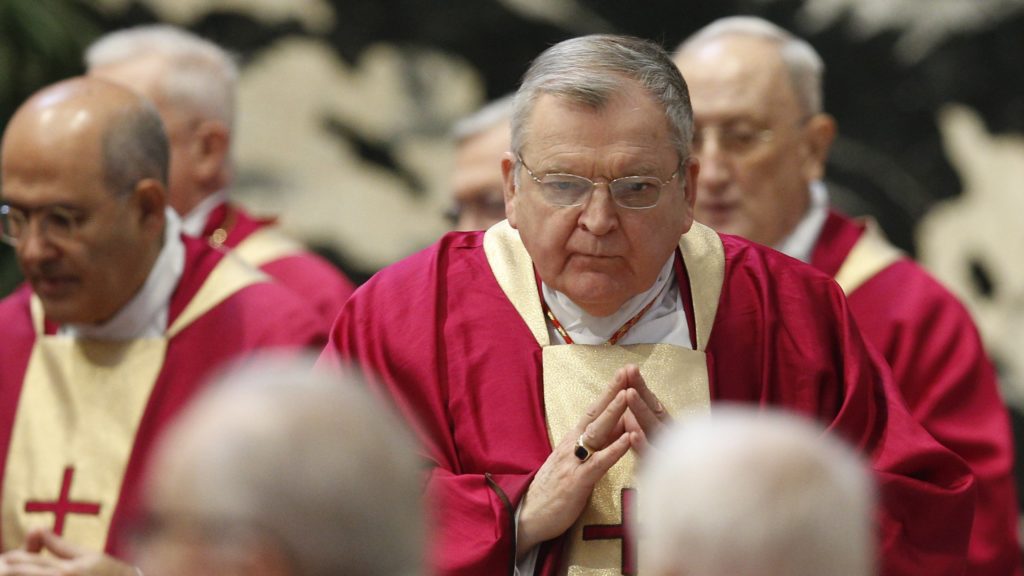In the foreword to a new booklet by a conservative group criticizing Pope Francis’s looming Synod of Bishops on Synodality, American Cardinal Raymond Burke has slammed the process surrounding the synod, calling it deeply harmful and potentially schismatic.
Burke, a hero to the traditionalist wing of the Catholic Church, has been a frequent Francis critic.
In his foreword, Burke said the booklet touches on “a most serious situation in the Church today” which he said “rightly concerns every thoughtful Catholic and persons of good will who observe the evident and grave harm which it is inflicting” on the church’s members.
“We are told that the Church which we profess, in communion with our ancestors in the faith from the time of the Apostles, to be One, Holy, Catholic, and Apostolic is now to be defined by synodality, a term which has no history in the doctrine of the Church and for which there is no reasonable definition,” he said.
Both the term synodality and its adjective, synodal, he said, “have become slogans behind which a revolution is at work to change radically the Church’s self-understanding, in accord with a contemporary ideology which denies much of what the Church has always taught and practiced.”
Titled “The Synodal Process is a Pandora’s Box: 100 Questions & Answers,” by José Antonio Ureta and Julio Loredo de Izcue, the booklet is an initiative of the conservative American Society for the Defense of Tradition, Family and Property (TFP), which also has repeatedly criticized Pope Francis.

The 100-page booklet was published in various languages, including English, Spanish, and Italian, on Tuesday, Aug. 22, less than two months before the synod is set to begin, and includes answers to questions insisting that Catholic doctrine cannot be changed and suggesting that the current Synod on Synodality is implementing at a universal level the same ideas as the recently-concluded national German synodal process, called the “Synodal Path.”
The German Synodal Path was launched in 2019 as a response to the clerical abuse crisis in Germany with the stated aim of giving laypeople more prominent roles in church leadership.
However, the process quickly diverted and grew contentious over outspoken calls by leaders in the discussion, including both laypeople and bishops, for women to be ordained priests and for priests to administer blessings to same sex couples.
Proposals were also made to end mandatory priestly celibacy, allowing priests in the Latin rite to marry, and to approve of same-sex marriage, as well as to allow women to administer baptisms, and for laypeople to participate in the election of their bishops.
The process also proposed the formation with new synodal structures formed by laypeople and bishops aimed at collaborative leadership, which has drawn criticism from the Vatican over the body’s potential to replace the national bishops’ conference.
The German bishops have apparently ignored the Vatican’s warnings, and since last summer they have been in a continual back-and-forth communication with the Vatican over the Synodal Path and its proposals. The Vatican recently announced that this process of dialogue with the German bishops will continue through regular meetings in Rome.
In his foreword, Burke echoed concerns that the Synod on Synodality is following the same path as the Germans, saying concern surrounding the synod is “not a purely theoretical matter, for the ideology has already, for some years, been put into practice in the Church in Germany.”
He said this process has “wildly” spread both “confusion and error and their fruit, division – indeed schism – to the grave harm of many souls.”
“With the imminent Synod on Synodality, it is rightly to be feared that the same confusion and error and division will be visited upon the universal Church. In fact, it has already begun to happen through the preparation of the Synod at the local level,” he said.
Burke insisted that only the truth of Christ as handed down “in the unchanging and unchangeable doctrine and discipline of the Church, can address effectively the situation by uncovering the ideology at work, by correcting the deadly confusion and error and division it is propagating, and by inspiring the members of the Church to undertake the true reform.”
This reform, he said, comes from daily conversion to Christ, who he said is “alive for us in the Church’s teaching, her prayer and worship,” as well as the practice of virtue and discipline.
Formally opened by Pope Francis in October 2021, the Synod of Bishops on Synodality is officially titled, “For a Synodal Church: Communion, Participation, Mission,” and is a multi-stage process that will culminate in two Rome-based gatherings in October 2023 and October 2024.
After an initial consultation with laypeople at the diocesan level, reports summarizing the conclusions were sent to national bishops’ conferences. Those reports served as the basis for discussion at the second, continental stage of the process.
The continental stage concluded earlier this year, and reports from each of the seven continental assemblies were used as a basis to draft the official working document, called the Istrumentum Laboris, for this October’s discussion in Rome at the universal level.
From Oct. 4-29, bishops and select delegates, including laypeople, will gather in Rome for the first of a two-part discussion, which will close with a similar gathering in October 2024.
It is expected to touch on several hot-button issues, including the role of women and the possibility of reinstituting the female diaconate as well as calls for women’s priestly ordination. Other issues such as the treatment and welcome of LGBTQ Catholics and divorced and remarried Catholics and the clerical sexual abuse crisis will also be discussed.
Burke in his foreword said the booklet “sheds the light of Christ, the truth of Christ, upon the present most worrisome situation of the Church.”
“The study of the questions and answers will help sincere Catholics to be Christ’s ‘fellow workers in the truth,’ as all members of the Church are called to be, and thus be agents of the renewal of the Church in our time, faithful to the Apostolic Tradition,” he said.
He thanked those who worked to formulate the Q&A, calling the questions “appropriate” and the answers “authoritative.”
“It is my hope that the fruit of their labors will become available to Catholics throughout the world for the building up of the Church,” Burke said, and asked that the Virgin Mary would intercede so that “the grave harm which presently threatens the Church be averted.”

